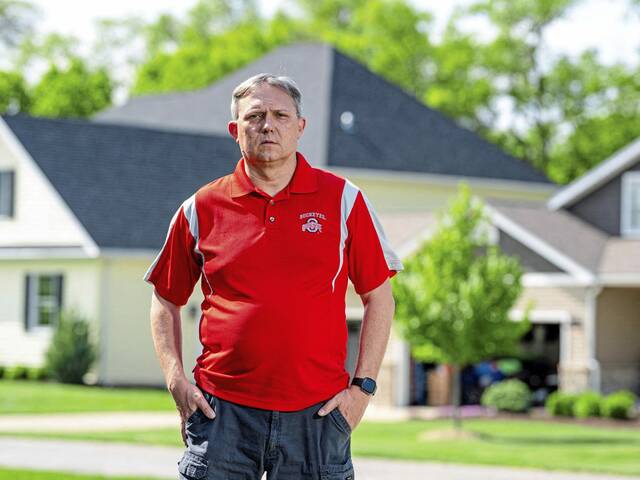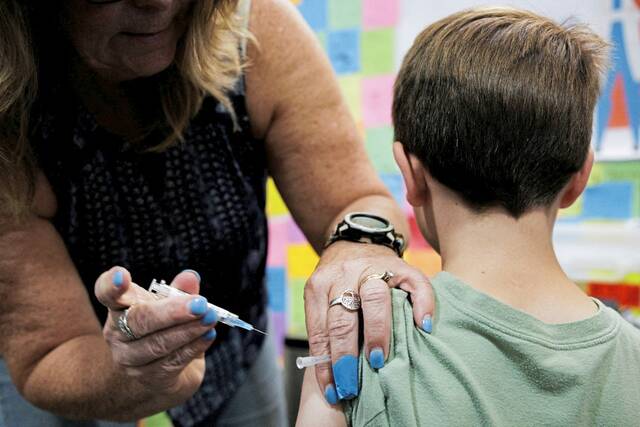Though wary of covid shots, these Trump voters balk at restricting traditional vaccines
Chad Hill thinks some questions need to be asked about vaccines.
Hill has harbored doubts about the covid-19 vaccine since it was introduced, due to how quickly it was developed and released. He suspects that medical experts who pushed the vaccine were compromised by ties to drugmakers. And he supported Health Secretary Robert F. Kennedy Jr.’s decision to fire a federal vaccine advisory panel.
When it comes to childhood vaccinations, a mainstay of U.S. public health for decades, Hill’s three teenage kids were unharmed by the shots that were required to attend school in their state of Ohio. But he is concerned that combined shots such as the measles-mumps-rubella immunization might be “too much” for young children and he worries about mercury in vaccines. He also takes seriously a friend who believes vaccines may have caused autism in his toddler.
A mercury-containing preservative that is used in some vaccines has not been used in childhood vaccines since 2001, according to the U.S. Centers for Disease Control and Prevention, which also says research has not shown any link between the preservative and autism.
Despite his concerns about childhood vaccines, Hill would not support new restrictions on them while more research is conducted.
“If there are people that want it, I think it should be available to them,” said Hill, a supervisor at a nuclear power plant. “While you’re studying [vaccines], let [them] be available.”
Hill is one of 20 Americans who voted for President Donald Trump whom Reuters has interviewed since February. Nearly all 20 voters have doubts about the covid-19 vaccine and many expressed concerns about vaccinations more broadly. Like Hill, they raised questions about conflicts of interest among those who set vaccine schedules and the amount of research done by the scientific community.
Still, each of these 20 Trump voters said they would only accept a certain amount of change before growing alarmed – and for each, that red line is in a slightly different place. Where Trump and Kennedy, a longtime critic of vaccines, ultimately land on healthcare policy remains to be seen. But dramatic changes to traditional vaccines would prompt pushback from these Trump voters, according to the interviews.
White House says Trump has complete confidence in RFK Jr.
Trump led the initiative to speed covid vaccine development in his first term. But he has supported Kennedy’s leadership of the Health and Human Services Department so far, including the Food and Drug Administration’s decision to narrow covid shot approval for Americans under 65, Kennedy’s firing of the vaccine advisory panel, and his claims linking autism to Tylenol and childhood vaccines. A recent poll found that only 1 in 4 Americans believe Kennedy’s recommendations are based on scientific evidence.
More than 20 health groups and medical associations have called on Kennedy to resign, saying his “repeated efforts to undermine science and public health” put Americans at risk of needless suffering and death.
A White House spokesperson told Reuters that Trump maintains “complete confidence” in Kennedy and said the new vaccine advisory panel appointed by Kennedy had revised guidance about who should get the covid vaccine but had not limited access to it. In September, the panel recommended that covid shots for all Americans only be administered through shared decision-making with a healthcare provider.
An HHS spokesperson said the department was delivering “transparency, accountability, and the restoration of their decision-making power” to the American people.
For now, most of the 20 Trump voters interviewed by Reuters are cautiously supporting Kennedy. Herman Sims, 66, a grandfather of seven in Dallas, Texas, who recently got a covid booster, said he supported Kennedy’s approach but trusted the Health Secretary to broaden access to the covid vaccine again if cases spiked.
“I do feel that if a pandemic or an outbreak does occur, he’s going to change all of that back,” Sims said.
Ending vaccine mandates would be ‘kind of scary’
Many voters in the group said they had never taken the covid vaccine, with a few even saying, contrary to scientific consensus, they believed it had caused more harm than good. covid vaccines in the first year of their use saved some 14.4 million lives globally, according to a study published in The Lancet Infectious Diseases journal.
Even among covid vaccine-skeptical voters, however, many feared that limiting traditional childhood vaccines could hurt public health.
Nobody in Loretta Torres’ family has been vaccinated for covid but she said her three young boys have gotten all the recommended childhood immunizations. Torres, who lives near Houston, Texas, wants parents to have some ability to delay or abstain from vaccinating their children if they fear adverse reactions.
But ending all vaccine mandates, as Florida is attempting to do, is “kind of scary”, said the 38-year-old Torres. “I feel like a lot of people are going to be at risk, and I definitely feel like children should be the number one population that shouldn’t be at risk.”
Brandon Neumeister, 36, a father of two in central Pennsylvania, said he had gotten the Johnson & Johnson covid vaccine even though he was “very skeptical” of it.
As for standard vaccines, he said: “I don’t see any reason or any benefit to making it more difficult to get them. If it has the potential to be a benefit to somebody, it should be made easier to get, if anything.”
Neumeister said he was alarmed by reports that lower vaccination rates had given rise to increasing measles outbreaks around the United States and North America.
Trump voters are suspicious of medical establishment
Many of the voters’ concerns over vaccines are rooted in a broader suspicion that the U.S. medical establishment is beholden to drugmakers. Several voters said they thought doctors who advocated covid shots and other immunizations were financially incentivized to do so.
Some drugmakers, such as Ozempic manufacturer Novo Nordisk, do pay medical professionals who in turn advocate use of their products. But popular claims that doctors have been enriched by the makers of the covid vaccines have been debunked.
Kennedy himself has no scientific training. Before joining the Trump administration, Kennedy was a longtime plaintiffs’ lawyer and played an instrumental role in organizing mass litigation against Merck over its Gardasil vaccine.
When Kennedy in June fired the 17-member expert vaccine advisory panel, comprising doctors and research scientists, he alleged that most of them received money from drugmakers. He provided no specific evidence of industry conflicts of interest among the fired panelists, who are required by law to declare all such potential conflicts of interest.
The perception that the former panelists were compromised stuck with many voters. “All those ties to the pharmaceutical companies… really throws your impartiality in doubt,” said Hill, 49, the Ohio father of three.
“We need people in [the advisory panel] that are actually scientists, that aren’t corrupted by large pharmaceutical companies, that don’t have an agenda,” said Jon Webber, 44, who lives in Indiana with his wife and teenage stepdaughter.
Webber said the barrage of sometimes conflicting guidance that came out during the covid-19 pandemic had also undermined trust in health experts: “Right now everybody’s a conspiracy nut. Why? Because the government’s gone back and forth with 22 different messages.”
Remove the ads from your TribLIVE reading experience but still support the journalists who create the content with TribLIVE Ad-Free.


